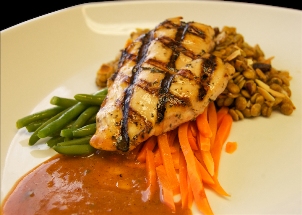Low-purine Diet
What is a low-purine diet?
A low-purine diet is an eating plan that limits foods that contain purine. Purines are a natural substance found in some foods. When your body digests purine, a waste product called uric (say: “yur-ick”) acid is produced. A buildup of uric acid crystals in the joints can cause a type of arthritis known as gout.
Purines are found in many healthy foods. The purpose of a low-purine diet is not to completely avoid purines. Instead, the goals are to limit and monitor how much purine is in the food you eat, and to learn how your body responds when you eat different foods that contain purine.
Who should follow a low-purine diet?
Your family doctor may recommend that you follow a low-purine diet if you have gout or another condition caused by high levels of uric acid (also called hyperuricemia). Following a low-purine diet may help reduce symptoms such as pain, redness and tenderness in your joints.
Our understanding of the role that eating habits play in conditions such as gout is becoming more clear as researchers learn more about these diseases. Keep in mind that dietary changes alone usually do not completely relieve gout symptoms. Talk with your family doctor about the benefit of dietary changes. If your family doctor has prescribed medicine for your gout, keep taking it until your doctor tells you to stop.
How do I get started?
Start by learning which of the foods that you eat are high in purine. Try to avoid eating high-purine foods and limit the amount of moderate-purine foods you eat. See the chart below for some suggestions.
| Avoid | Limit | Enjoy |
|---|---|---|
| Beer | Chicken, beef, pork and duck | At least 12 cups of fluid, such as water or fruit juice |
| Soft drinks that contain sugar | Crab, lobster, oysters and shrimp | Low-fat and fat-free dairy products, such as cheese and yogurt |
| Fatty food | Lunch meats, especially high-fat versions | Eggs (in moderation) |
| Organ meats, such as liver, from any animal source | Liquor | Peanut butter and nuts |
| Bacon, veal and venison | Rice, noodles, pasta and potatoes | |
| Yeast | Fruits | |
| Anchovies, sardines, herring, mussels, codfish, scallops, trout and haddock | Vegetables |
|
| Gravy | Wine (in moderation) | |
| Coffee (in moderation) |
Different people’s bodies react differently to different foods. You will probably learn over time what foods do or do not affect you. If you discover that a food tends to cause your gout to flare up, avoid eating that food. Likewise, you can more freely enjoy foods that do not cause problems.
Losing weight can also help reduce symptoms of gout. However, it’s important not to lose weight too quickly. Fasting and rapid weight-loss diets can actually increase the amount of uric acid in your body. Also avoid low-carbohydrate diets that are high in protein and fat because foods that are high in protein and fat usually contain significant amounts of purine.
-
8 Healthy Foods to Boost Your Immune System
8 Healthy Foods to Boost Your Immune System Although the immune s
-
How to Use Garlic to Lose Belly Fat Fast
Garlis works amazing when it comes to losing weight naturally. It
-
How To Lose Weight – FREE Weight Loss Tips For Losing Fat Fast
If I had to guess, I’d say the most common goal in the diet a
-
4 New Ways to Outsmart Fat Traps
Getty Images You know to ignore
-
Weight Loss Plan - Set Yourself Up For Success
Your weight loss diet helps your program to be successful. The wrong
-
Weight Loss Dietician, Indian Dietician, Weight Loss Diet, Weight Loss Diet Tips
Life Century is a twentieth century Indian healthcare company but our
- DON'T MISS
- How to keep fruit and vegetables fresh
- Diet Tips for Healthy Eating
- Good & Bad Fat – Saturated, Trans, Polyunsaturated & Monounsaturated Fats
- Cutting These 8 Habits Will Help You Lose Weight
- Healthy dieting tips teenagers
- Real Weight Loss Diet
- 8 Holiday Treats Under 80 Calories
- 5 Unexpected Reasons You’re Gaining Weight
- The importance of a good breakfast for weight loss
- How to Not Overeat This Thanksgiving




